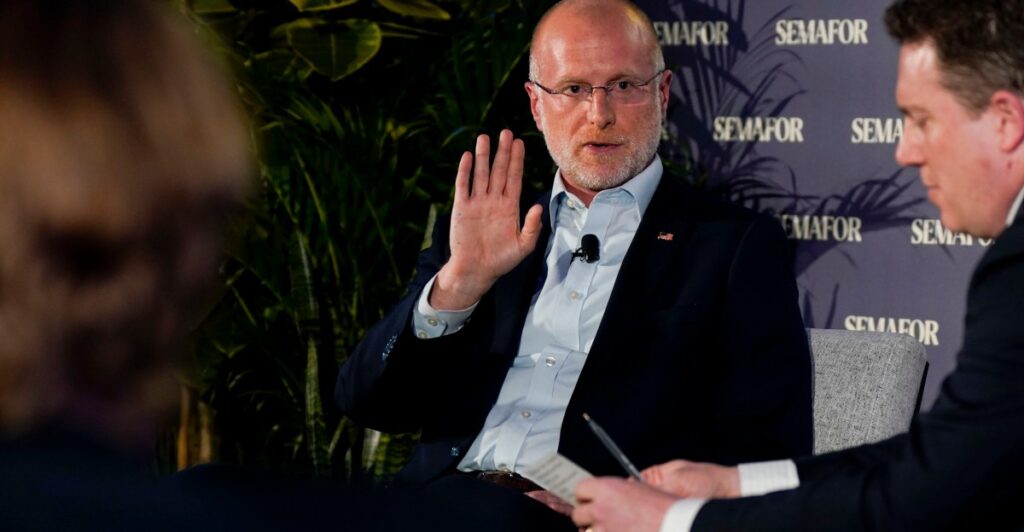
On Monday, the Freedom of the Press Foundation filed a complaint against Federal Communications Commission Chairman Brendan Carr. The filing, sent to the Office of Disciplinary Counsel at the DC Court of Appeals, alleges that Carr had repeatedly broken basic principles of conduct as a licensed attorney, including by leveraging his power to control media outlets’ speech. As a legal complaint it’s a long shot — but as a document, it sums up months of Carr’s escalating war on free speech.
While the complaint’s examples go back months, Status reports that the FPF’s “tipping point” was Carr’s recent approval of a merger between Paramount and Skydance. It’s a situation that started out sketchy and has somehow managed to look steadily worse.
For months, the FCC let the request languish while Paramount negotiated a specious anti-speech lawsuit from President Donald Trump. Then, Paramount paid Trump $16 million in settlement money — but that wasn’t enough. The merger was approved on the condition that the new company appoint an ombudsman to guarantee it aired viewpoints “across the political and ideological spectrum,” a directive found nowhere in the FCC’s usual rules. Along the way, Paramount subsidiary CBS canceled the show of comedian and Trump critic Stephen Colbert — insisting the decision was purely financial, only to have Carr show up on CNBC and imply it had helped the company comply with FCC law.
“The American people simply do not trust the mainstream media, and for broadcasters — again, different than cable, different than podcasts — for broadcasters, they have a federal license, and they are obligated to operate in the public interest,” Carr said when asked about Colbert’s show ending. “And to the extent that we’re starting to see some changes, I think that’s a good thing.”
An “unconstitutional shakedown”
There’s no reasonable way to spin the combination of Trump and Carr’s actions except as an attack on the First Amendment, or in a phrase quoted by the complaint, an “unconstitutional shakedown.” Trump disliked how a news outlet edited an interview with a political rival. In retaliation, one of his officials threatened its parent company. To placate him, the company agreed to produce more work with his preferred politics, under the supervision of a government-appointed monitor.
What’s a little easier to elide is who this hurts. Nominally, the victims are Paramount and Skydance, a pair of giant corporations facing a threat to their bottom line. But the real target is everyone who enjoys news, comedy, or virtually any other kind of broadcast media, and the stakes are the freedom to choose what you watch.
The merger conditions require “a diversity of viewpoints,” which sounds like a lofty goal — but let’s play out what it means in Carr and Trump’s world. The original CBS lawsuit claimed the network had edited an interview with Democratic presidential nominee Kamala Harris that made Harris look too articulate — so to start, the ombudsman will probably be looking at how politicians are presented in news coverage, encouraging journalists to show Trump’s critics in a negative light.
Carr celebrated Colbert’s cancellation as a “course correction,” so comedians are on notice too. And over at another network, Disney, Carr has presented attempts to create diverse show lineups as an example of “invidious” and illegal “DEI.” So prepare for probes into the racial or gender makeup of the shows it greenlights, making sure its TV programming isn’t too diverse in the wrong ways.
The whole situation was skewered earlier this month in the season debut of one of Paramount’s crown-jewel TV shows, South Park, which sees the eponymous town shaken down with a multibillion-dollar lawsuit from Trump. It’s full of barely veiled parallels with the Paramount situation and suggestions that it’s South Park, not just South Park, under threat. (The White House insulted the show, but so far, it seems safe.)
Conservatives have warned darkly for years that Democratic presidents’ FCC operations amount to censorship, frequently raising the specter of a “new Fairness Doctrine,” referring to the long-defunct rule that broadcasters must present multiple viewpoints on matters of public interest. The offending policies have ranged from actual surveys of newsroom operations to far-afield consumer protection efforts: in 2016, Trump claimed that “net neutrality is the Fairness Doctrine” and “will target conservative media.” Now, a Republican commissioner just put the government’s thumb straight on the scale of American culture, insisting that networks shouldn’t build their businesses on what customers like — they should look to Donald Trump.
In a country where media companies are endlessly consolidating, the FCC is in a position to stall any business that seeks a merger until it extracts the terms it wants. It’s already landed anti-“DEI” provisions from a different company, Verizon, and there’s no reason to think it will stop there. It seems unlikely the FPF’s complaint will seriously derail this mission. But it baldly lays out just how badly Carr has failed at doing what he demands of broadcasters: serving the public interest by allowing a free expression of views.
 Latest Breaking News Online News Portal
Latest Breaking News Online News Portal






